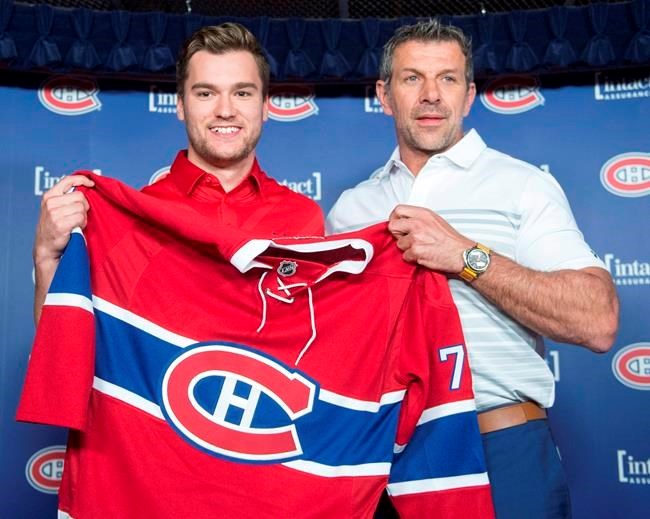The last time the NHL had an expansion draft, Steve Yzerman was coming off a Selke trophy-winning season as captain of the Detroit Red Wings.
Seventeen years have passed, and it appears general managers are still determining how to best protect their rosters, even as a key deadline for the Vegas Golden Knights draft draws near.
Though Yzerman, now the GM of the Tampa Bay Lightning, made a bold strike Thursday when he sent promising 23-year-old Jonathan Drouin to Montreal, he thought caution was mostly ruling the day.
"The league has been pretty quiet," Yzerman said.
Teams have until Saturday at 5 p.m. ET to submit a list of players protected from exposure to the Golden Knights — either seven forwards, three defencemen and one goaltender or eight skaters and a goalie.
Fear of losing a valuable asset for nothing has some searching out trade options.
"We have an idea of who we're going to protect, but I'm not going to let anybody know what those players are because we're still talking to different teams and we still might make a move," Canucks GM Jim Benning said in an interview. "Nothing's set in stone until Saturday at 5 o'clock eastern when we have to submit the list."
In trading away Drouin, the Lightning opened up one more space on their protection list, which might mean 24-year-old centre Vladislav Namestnikov remaining in Tampa.
"It's a part of the reason we like this trade," Yzerman said of the deal, which netted Mikhail Sergachev, a high-upside defensive prospect who is exempt from exposure to Vegas. "We were able to acquire a player that we do not have to protect and it gives us a little more clarity there."
Still, wariness lingers for the domino effect of trading a player who might be picked by Vegas simply to gain an asset.
"The problem in that is you're going to lose one player no matter what right," Benning said. "So if you have five defencemen, say, and you can only protect three — so you trade one defenceman off for a draft pick or young assets and then you're going to lose another defenceman to Las Vegas and then all of a sudden, you're two D down, you know what I mean?
"So you're better off just taking your lumps, know you're going to lose a player and just move on."
Such a reality confronts squads with deep defence cores like Minnesota and Anaheim. With too many quality defenders to protect, both have been reportedly seeking trades.
While scooping up a potential star in Drouin, the Canadiens will likely lose a better asset to Vegas — perhaps Paul Byron or Charles Hudon — in addition to Sergachev and a conditional second rounder in 2018.
"We gave up a lot but I'm convinced we got back a big piece," Habs GM Marc Bergevin said.
Benning said the Canucks have been preparing for the expansion draft since the March 1 trade deadline. The club traded popular winger Jannik Hansen knowing it would have difficulty protecting him from the Golden Knights.
"When we set our roster we're going to end up losing a player that we like and we don't want to lose, but that's just part of the whole expansion process," said Benning, who had trouble recalling the last expansion draft, it had been so long.
Conditions are different from 2000 when teams lost two players to Columbus and Minnesota. Above all, there was no salary cap to consider.
Clubs now have to weigh contracts and value when strategically deciding which players to expose. Ottawa GM Pierre Dorion hoped Dion Phaneuf would waive his no-movement clause and risk exposure because his age (32) and contract — four more years with a $7 million annual cap hit — likely wouldn't appeal to Vegas.
Phaneuf ultimately declined.
Benning thought his peers were anxious to make moves without knowing the salary cap for next season. Commissioner Gary Bettman suggested recently that the upper limit might remain at or close to last year's mark of $73 million.
"I think there's a lot going on right now and we'll have a better idea after the weekend when they set the cap for the next year and the teams set their rosters for expansion and we know who's out there, who's available," Benning said. "And I think that's when the conversations with Las Vegas are really going to heat up then."
Though trade and waiver activity will be frozen at 3 p.m. on Saturday, the Knights will still be free to execute trades and perhaps come to agreements with rival clubs on who might be selected. Vegas could agree, for example, not to pick a certain player in exchange for a draft pick.
Yzerman said it was about measuring what such a trade might cost "versus the risk of the unknown, what you're going to lose or the general unknown."
Jonas Siegel, The Canadian Press

